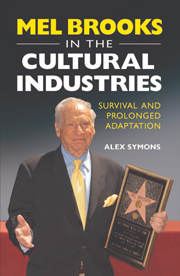Book contents
- Frontmatter
- Contents
- Acknowledgements
- Introduction
- 1 Rethinking Adaptation Studies: Survival Strategies in the Cultural Industries
- 2 From Sitcoms to ‘Parody-coms’: Writing for American TV, 1949–89
- 3 Prolonged Stardom: Audio Records, TV and Film, 1961–2004
- 4 Recycled Hollywood for the TV Generation: The Rise of Parody and the Fall of Mel Brooks the Director, 1974–95
- 5 The Integration of the Film and Theatre Industries: The Producers, 1968–2007
- Conclusion
- Bibliography
- Index
5 - The Integration of the Film and Theatre Industries: The Producers, 1968–2007
Published online by Cambridge University Press: 05 August 2013
- Frontmatter
- Contents
- Acknowledgements
- Introduction
- 1 Rethinking Adaptation Studies: Survival Strategies in the Cultural Industries
- 2 From Sitcoms to ‘Parody-coms’: Writing for American TV, 1949–89
- 3 Prolonged Stardom: Audio Records, TV and Film, 1961–2004
- 4 Recycled Hollywood for the TV Generation: The Rise of Parody and the Fall of Mel Brooks the Director, 1974–95
- 5 The Integration of the Film and Theatre Industries: The Producers, 1968–2007
- Conclusion
- Bibliography
- Index
Summary
In order to sustain his long career in show business, Mel Brooks has capitalised on adapting material between theatre and film. This strategy is clearly apparent in the invention and prolonged life of his film The Producers (1968). This process started with The Producers itself, which Brooks originally manufactured largely by appropriating content from Broadway shows. This film, best understood as a jarring hybrid between Broadway and Hollywood, made Brooks's name as a director, and in later years, gradually became a ‘cult’ work with film critics, in part, for its ‘theatrical’ qualities. Brooks then capitalised on that critical popularity by remediating his 1968 film into a Broadway musical, The Producers (2001-7). That version was a massive commercial and critical success internationally. Following that project, Brooks then prolonged the work through adaptation into yet another Hollywood film, The Producers (2005). By examining Brooks's prolonged adaptations of this work in historical context – looking at the way they bring ‘cinematic’ content and audiences into theatres, and ‘theatrical’ content and audiences into cinemas - it is evident that Brooks has contributed towards, and capitalised on, the increasing modern integration of the film and theatre industries.
- Type
- Chapter
- Information
- Mel Brooks in the Cultural IndustriesSurvival and Prolonged Adaptation, pp. 154 - 184Publisher: Edinburgh University PressPrint publication year: 2012



